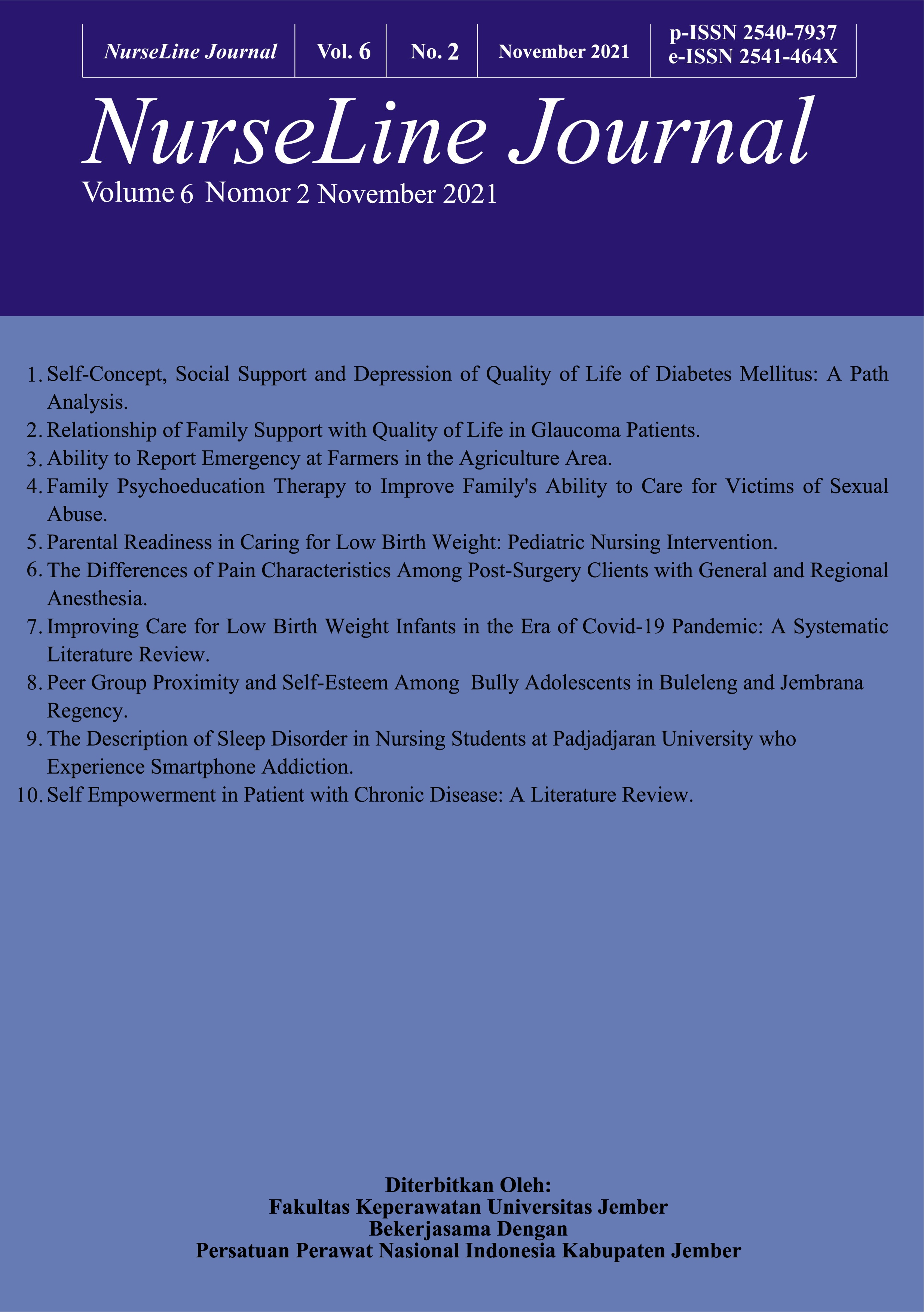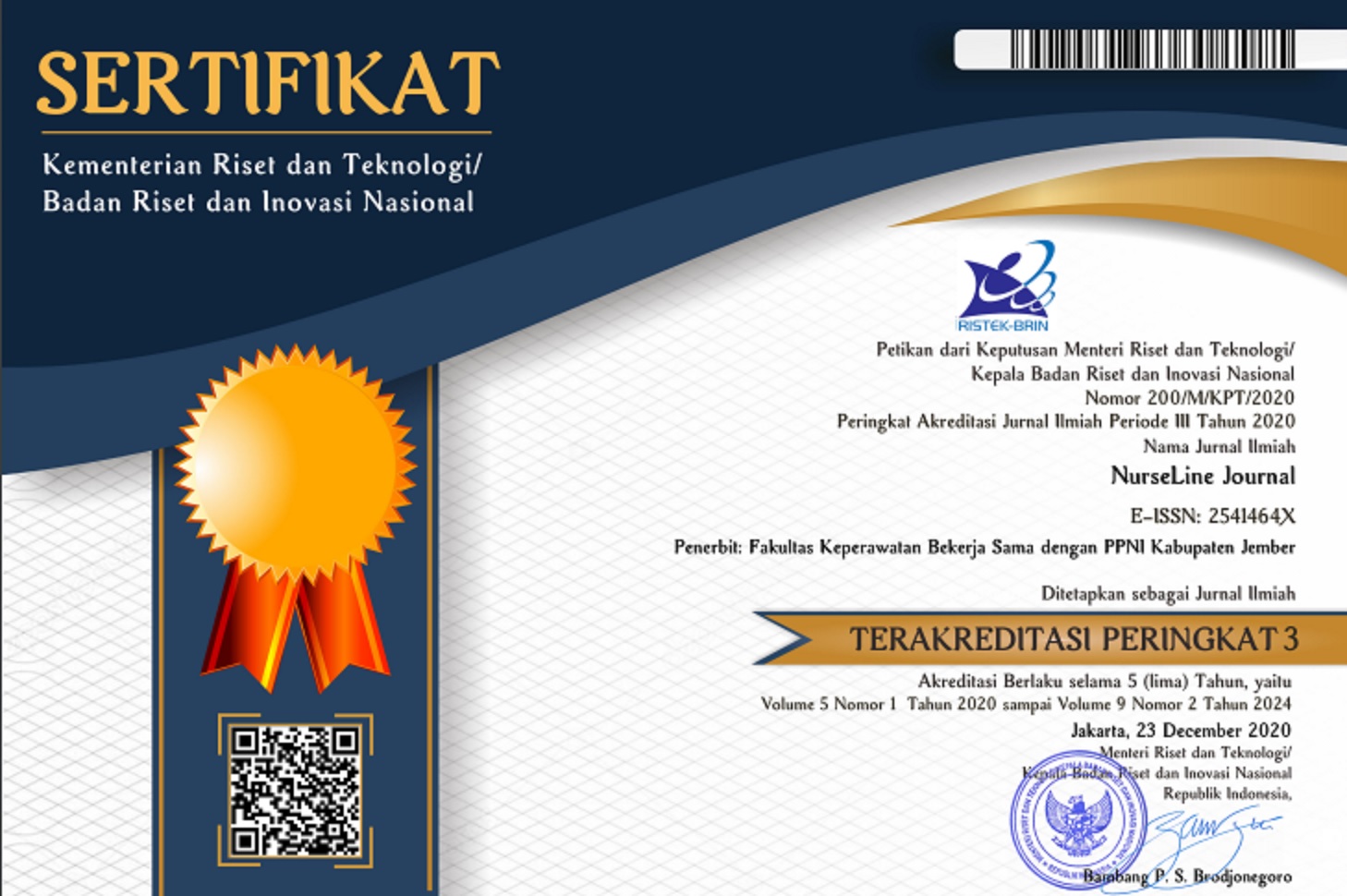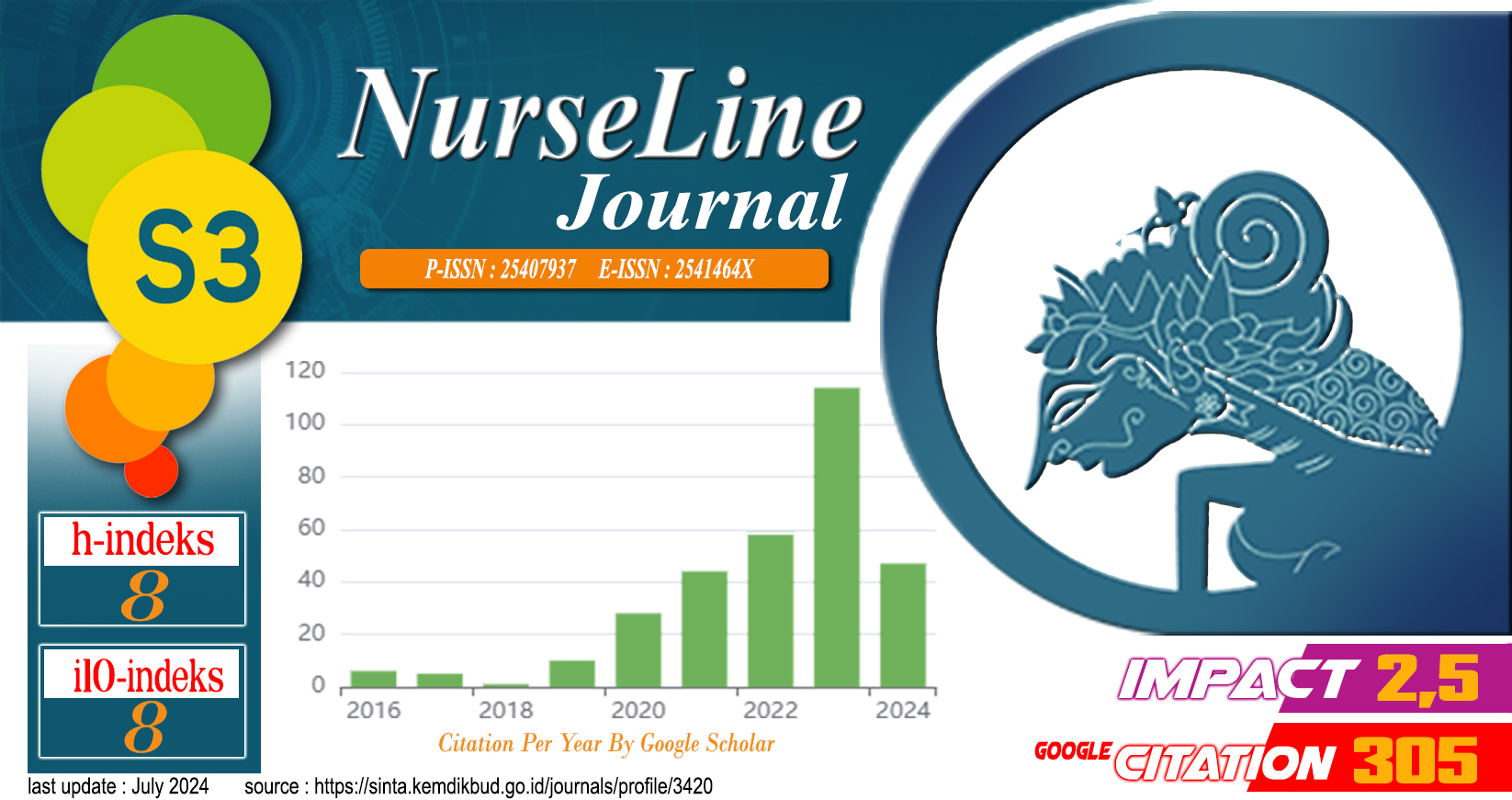Family Psychoeducation Therapy to Improve Family's Ability to Care for Victims of Sexual Abuse
Abstract
Background: Sexual abuse is increasingly occurring but it is difficult to detect. Victims and their families usually do not want to reveal the sexual abuse clearly, complicates intervention efforts. The most incidents of sexual abuse occurred in children and adolescents, which is called child sexual abuse. Aim This study was conducted to analyze the effect of Family Psychoeducation (FPE) therapy on family’s ability to care for children who experienced sexual abuse (post sexual abuse) in the working area of Women's Crisis Center (WCC), Jombang Regency, East Java. Method: This study utilized pre-experimental design with one group pretest-posttest design; using one treatment group, with observations conducted to the group before and after treatment. The population in this study were all families with children who experienced sexual abuse with a total of 133 respondents. By using simple random sampling technique, 100 samples were obtained. The measuring instrument used was a questionnaire on both variables. Data processing was carried out by editing, coding, scoring, and tabulating, while data were analyzed using the Wilcoxon test. Results: Results obtained p value = 0.000 (<0.005), indicating that H1 was accepted. It means that there was an effect of Family Psychoeducation (FPE) therapy on the family's ability to care for children who experienced sexual abuse (post sexual abuse) in the working area of Women's Crisis Center, Jombang Regency. Conclusion: This study concludes that the most common case of sexual abuse is sexual violence. The results show that there is an effect of family psychoeducation (FPE) therapy on the family’s ability to care for children who experienced sexual abuse (post sexual abuse).
References
Hidayat, A. A., 2017. Metodologi Penelitian Keperawatan dan Kesehatan. Jakarta: Salemba Medika.
Buanasari, A., Keliat, B. A. and Susanti, H. (2020) ‘The Application of Acceptance Commitment Therapy (ACT) and Family Psychoeducation (FPE) to Clients with Scizophrenia and Aggressive Behavior’, Nurse Media Journal of Nursing, 10(1), pp. 11–21. doi: 10.14710/nmjn.v10i1.22220.
Castillo, R. F. P. and Talavera, D. A. A. (2020) ‘Findings from an intervention on the prevention of sexual abuse of children from mayan communities in Mexico’, in An International Perspective on Contemporary Developments in Victimology: A Festschrift in Honor of Marc Groenhuijsen. Springer International Publishing, pp. 151–163. doi: 10.1007/978-3-030-41622-5_11.
Halim and Hamid (2020) ‘journal hubungan tindakan psikoedukasi keluarga dengan kemampuan keluarga 2020 - Penelusuran Google’, Jurnal Keperawatan Jiwa, 8(2), pp. 193–202. Available at : https://www.google.com/search?safe=strict&sxsrf=ALeKk02FQar9i_yuH9N-0whTb6Z4_dedQQ%3A1603993638425&ei=JgCbX_vDGcLWz7sP7tSY8A0&q=journal+hubungan+tindakan+psikoedukasi+keluarga+dengan+kemampuan+keluarga+2020&oq=journal+hubungan+tindakan+psikoedukasi+keluar (Accessed: 30 October 2020).
Handayani, M. (2017) ‘Pencegahan Kasus Kekerasan Seksual Pada Anak Melalui Komunikasi Antarpribadi Orang Tua Dan Anak’, JIV-Jurnal Ilmiah Visi, 12(1), pp. 67–80. doi: 10.21009/jiv.1201.7.
Harvey, C. (2018) ‘Family psychoeducation for people living with schizophrenia and their families’, BJPsych Advances, 24(1), pp. 9–19. doi: 10.1192/bja.2017.4.
Herminsih, A. R., Barlianto, W. and Kapti, R. E. (2017) ‘Pengaruh Terapi Family Psychoeducation (Fpe) Terhadap Kecemasan Dan Beban Keluarga Dalam Merawat Anggota Keluarga Dengan Skizofrenia Di Kecamatan Bola Kabupaten Sikka, Nusa Tenggara Timur’, Jurnal Kesehatan Mesencephalon, 3(2). doi: 10.36053/mesencephalon.v3i2.48.
Lo, H. H. M. et al. (2019) ‘A brief mindfulness-based family psychoeducation intervention for Chinese young adults with first episode psychosis: A study protocol’, Frontiers in Psychology, 10(MAR). doi: 10.3389/fpsyg.2019.00516.
Mathews, B. (2017) ‘Optimising implementation of reforms to better prevent and respond to child sexual abuse in institutions: Insights from public health, regulatory theory, and Australia’s Royal Commission’, Child Abuse and Neglect, 74, pp. 86–98. doi: 10.1016/j.chiabu.2017.07.007.
Merdekawati, D. (2017) ‘93) Hubungan Pengetahuan Keluarga Dan Tingkat Retardasi Mental Dengan Kemampuan Keluarga Merawat’, Journal Endurance, 2(2), p. 186. doi: 10.22216/jen.v2i2.1963.
Miller, K. S. et al. (2015) ‘Curriculum Development Around Parenting Strategies to Prevent and Respond to Child Sexual Abuse in Sub-Saharan Africa: A Program Collaboration Between Families Matter! and Global Dialogues’, Journal of Child Sexual Abuse, 24(8), pp. 839–852. doi: 10.1080/10538712.2015.1088913.
Nursalam, 2017. Metodologi Penelitian Ilmu Keperawatan : Pendekatan Praktis. Jakarta: Salemba Medika.
Sanjeevi, J. et al. (2018) ‘A Review of Child Sexual Abuse: Impact, Risk, and Resilience in the Context of Culture’, Journal of Child Sexual Abuse, 27(6), pp. 622–641. doi: 10.1080/10538712.2018.1486934

This work is licensed under a Creative Commons Attribution-ShareAlike 4.0 International License.
















